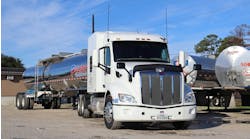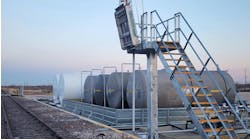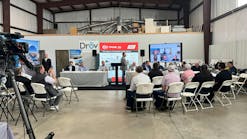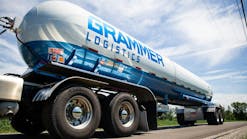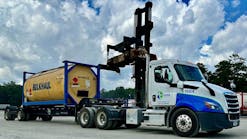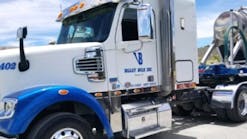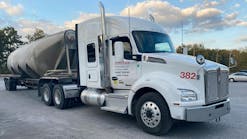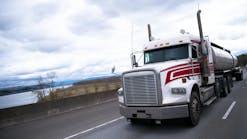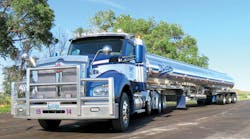Dixon Bros’s fleet specs stress weight efficiency, productivity
DESPITE the higher gross combination weights allowed across most of the western United States, the management team at Dixon Bros Inc is always looking for ways to boost payload. Every component on a tractor or trailer is examined for weight efficiency.
Based in Newcastle, Wyoming, the tank truck carrier was established in 1960 and has grown into a diversified operation with 120 tractors and more than 300 trailers. The carrier serves a broad customer base with liquid and dry bulk cargoes that include gasoline, diesel, propane, asphalt, cement, fly ash, and bentonite.
Petroleum hauling accounts for a majority of the carrier’s revenue. While petroleum hauls are year-round, most of the cement and fly ash activity is during the summer construction season.
“We haul primarily gasoline and diesel to convenience stores, coal mines, and airports, and also transport propane to wholesalers,” says Jim Dixon, who founded Dixon Bros 56 years ago. “Most of our runs are 250 or fewer miles one-way, but we do go out as far as 500 miles, and we do run into Canada.”
Operations are concentrated in Wyoming, South Dakota, North Dakota, and Montana. Northern Colorado was added to the operating area in October 2016 when Dixon Bros bought a small Colorado petroleum hauler.
“This was our first move into Colorado,” Dixon says. “We added five new petroleum transports to the six that were already in operation. These are all five-axle rigs set up for a maximum gross combination weight (GCW) of 80,000 pounds.”
The Colorado vehicles have the lowest GCW in the Dixon Bros system. In contrast, maximum GCWs allowed in other states served by the carrier range from 99,000 pounds for seven-axle rigs to 129,000 pounds for a doubles train. Whatever the maximum weight allowed, Dixon Bros managers want to make sure payload accounts for every possible pound.
The newest tractors in the Dixon Bros fleet are Kenworth T880s with 525-horsepower engines and 13-speed automated transmissions. The higher horsepower engines are needed for the heavier gross combination weights.
Tractor equipment includes an SAF Holland aluminum fifthwheel and a hydraulic power system from Dakota Fluid Power to run trailer-mounted product pumps. “The stainless steel Dakota system allows the engine to run at idle when we are pumping off fuel, but it will run the engine up to 1,200 rpm for dry bulk products,” Dixon says.
Dixon Bros spec’d the new tractors with a full Meritor system that includes drive axles and a lube-free driveline. The carrier chooses Meritor brakes with 8 5/8-inch shoes for longer life.
“We have used Meritor brakes for years, and put them on both the tractor and trailer because we want a balanced braking system,” Dixon says. “On trailers, we have Meritor axles and air suspension, and we also spec Meritor tire inflation by PSI.”
Part of the weight-saving effort at Dixon Bros included specifying the newest T880 tractors with Kenworth’s new 40-inch sleeper. In addition to weight savings, the smaller sleeper enhanced productivity.
Dixon says the 40-inch sleeper is now the configuration of choice for Dixon Bros. When Kenworth launched the 40-inch sleeper last fall, Dixon was quick to recognize the potential benefits.
“We run some Kenworth T880s with 52-inch sleepers. Before the 40-inch sleeper, we had to obtain special permitting to run in Canada because of our overall length,” he says. “With the smaller sleeper we saved 12 inches to reach a 244-inch wheelbase, which allows us to run legal in Canada.
“We can also now mount the lift axle closer to the steer axle to optimize weight distribution. And with the complex bridge laws in the United States, we wanted the 40-inch sleeper so our spec would work in all areas and regions. Kenworth’s 40-inch sleeper is the right size for us, and also offers additional payload opportunities with a 260-pound weight savings compared to the 52-inch sleeper.”
Dixon says his drivers might use the sleeper once a week, “or it could be once a month—overall pretty minimal. But, we need the 40-inch sleeper just for that, the occasional night’s sleep. It’s also a safeguard for bunk time in bad weather.”
The 40-inch sleeper has a compact, yet comfortable sleeping environment and optimal storage. A 24-inch wide by 75-inch long, liftable bunk with 90-degree tilt offers easy access to under bunk storage. The sleeper provides more than 22 cubic feet of storage space to handle gear for occasional stays in the sleeper, and has storage shelves and a cell phone cubby.
The tractor fleet works with a variety of tank trailers. Petroleum trailers predominate, and newest ones were built by MAC Trailer in Billings, Montana. Tandem-axle semi-trailers have a 9,500-gallon capacity, and tri-axle semi-trailers can carry up to 12,500 gallons. Rock Mountain doubles consist of a 9,500-gallon lead trailer and a 5,200-gallon pup.
“We chose MAC Trailer for our petroleum tanks because their plant is within 300 miles of our corporate office,” Dixon says. “One benefit is that shipping costs less for replacement parts needed for trailer repairs.”
Most of the petroleum trailers in the fleet have Blackmer product pumps. Petroleum tankers also are specified with Dixon Bayco’s FloTech overfill system and Betts hardware.
Dry bulker doubles include 1,680-cu-ft lead trailers and 840-cu-ft pups. Propane is transported in tandem-axle MC331 trailers with capacities ranging from 11,000 to 11,600 gallons. Dixon Bros also runs some quad-axle propane trailers that can legally haul 12,500 to 12,700 gallons of propane. Propane trailers have Corken product pumps. ♦
